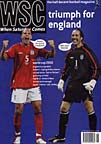 Phil Ball looks back on a strange tournament for the Spanish team, in which they missed out yet again, but for once did not take the rap
Phil Ball looks back on a strange tournament for the Spanish team, in which they missed out yet again, but for once did not take the rap
Getting beyond the World Cup quarter-finals would have represented a major image problem for Spain. The whole country would have been required to change its mind-set, from might-have-been-if-it-hadn’t-been-for-the-refs to something else less complicated, less open to the historical shrug. There had been signs that the country had been preparing for this, the press beginning to break its self-imposed vow to keep all optimism and flag-waving to a minimum.
After the Ireland match, people were beginning to believe that previously outrageous fortune was at last on their side. The heart-stopping penalty escapade had suddenly put a new perspective on things. During extra time, the Spanish hanging on with, effectively, nine men, the siege mentality stuff seemed to give the press a new hook for the squad. Whereas before there had been a rather false outbreak of “respect” for the Irish, the mood was now upbeat. On the streets the folks were praising them as fighters and the quarter-finals were in sight. South Korea? Plenty of spirit but not much idea. Anything but the Italians, the bestia negra (hoodoo side) of the Spanish for so many years.
In the end, though, Spain were again hoist with their own petard by publicly announcing their relief at avoiding the Italians, and demonstrating a certain lack of sympathy for the circumstances in which they had lost. Before the quarter-final, the feeling was that Byron Moreno’s alleged errors in the Italy v South Korea game would work in Spain’s favour. Various journalists expressed the view that it could not happen again, and that the designated referee would be more than likely to favour our boys. Hardly anyone believed Korea could win, by either fair means or foul.
But for the Spanish there is nothing like perceived injustice to bring together the disparate elements that make up the country. The team flew home to a rapturous reception – in marked contrast to previous World Cups. In fact this is the first time in most people’s memory that there has been such a welcome. You could see that the players appreciated it, and that their slightly bemused expressions suggested they had been unsure as to how the public had viewed the events.
The squad has often felt unloved, at least outside of the heartlands of Madrid and Seville. Now that they’ve been subjected to an unusual national hug, who knows how they might respond? Even Camacho was smiling – a particularly rare event – and it is rumoured that various deodorant companies are queuing up for his services in their advertising campaigns. All he will be required to do will be to wave his arms around in exchange for a fat cheque – which is exactly what he was accused of by the Spanish press in the build-up to the World Cup. Now, however, he’s gutsy and clever, at least until September.
A more neutral view of the whole episode is that Spain were one of the best sides left in the competition by the quarter-final stage. Yet in such a tournament, where for a while there was a curious outbreak of equality of opportunity, this is not as meaningful as it might appear. What seems to have got the world uniquely on Spain’s side were the circumstances surrounding the two famously disallowed goals, and the more indisputable fact that they had been playing attractive football for long periods.
In the first half against Korea, where the hosts hardly got a touch, Spain looked masterful. They never quite managed to be so for an entire game, even against Slovenia, and the geriatric members of their defence were always open to panic when players ran at them, but in a sense this was all part of the attraction. In all of their games they came on to the pitch looking to run the show. Despite the general feeling that this was a highly entertaining tournament, there were few teams like Spain. And as soon it was clear that Joaquin of Real Betis was worth more than the occasional run-out, we had the unusual sight of a national team playing with two wingers – De Pedro doing some silky stuff over on the left.
The downside to the Korean kerfuffle has been the casual racism with which the Spanish press has called for European referees to officiate in the later stages of a World Cup – although they are far from alone in this demand. The implications are, of course, that not only are “exotic” officials naturally incompetent but also more open to corruption. The great irony, entirely lost on the Spanish press, is that the worst referee by far in the tournament was their own López Nieto, now in the record books for flashing his cards like an out-of-control automaton in Germany v Cameroon.
But he’s not part of the equation. The news is that they wuz robbed, and in 2004 they should be there to try to put the record straight. For a change, a lot of people are going to be on their side.
From WSC 186 August 2002. What was happening this month
Funny how times have changed. In the end, football won out. If Holland had been crowned World Champions on the strength of what we saw last night, we'd all be wondering what it was all for today. Still, much to look forward to next time. WSC's coverage has been immense as ever. http://gregtheoharis.wordpress.com/2010/07/11/the-end/